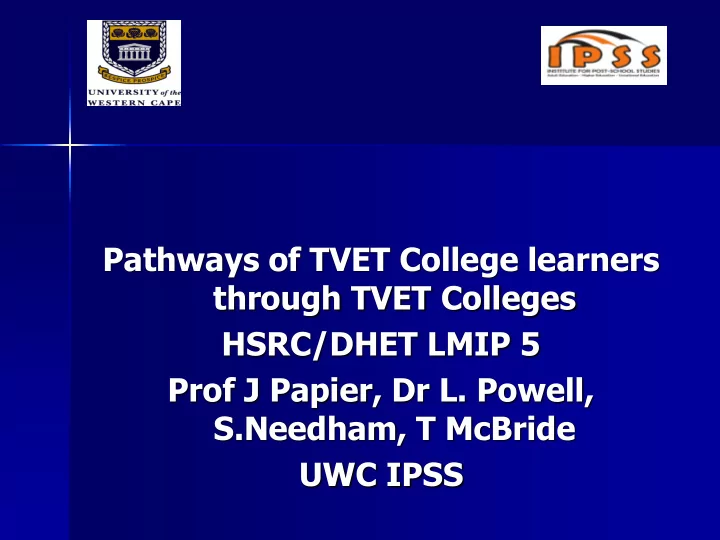

Pathways of TVET College learners through TVET Colleges HSRC/DHET LMIP 5 Prof J Papier, Dr L. Powell, S.Needham, T McBride UWC IPSS
Research Study The research study was commissioned by the Human Sciences Research Council (HSRC) and DHET The study is located within Theme 5 of the HSRC Labour Market Intelligence Partnership (LMIP) that has multi-cohort panel studies with a focus on: – Access to post-school training and education – Pathways or trajectories from school and through the post- school sector – Transitions from and through education and training into the labour market
Our Research Questions Who accesses and progresses through the NATED qualification route? What are the destinations of NATED graduates at key exit points? What has been the take-up of NATED college graduates within industry?
Targeted Respondents Public TVET College NATED N3 and NATED N6 Engineering Studies graduates in 2013 NATED N6 Business Studies from 2013 21 000 records obtained from DHET for 50 TVET Colleges 20 % sample achieved with 4 050 respondents After cleaning of the data, 3013 respondents completed the survey
Methodological Findings Use of a commercial call centre together with academic inputs enables large scale longitudinal research The lack of accurate data continues to be a problem within the TVET post-school sector Data had to extensively cleaned and duplicates removed, which takes significant time College graduates are difficult to track after graduation as contact details change frequently Paucity of research on the TVET sector does not allow for benchmarking/comparison over time
Research findings Weighted respondents – by race 96.2% 100.0 75.0 50.0 25.0 2.1% 1.5% 0.3% 0.0 Black Coloured White Asian
Research findings Profile of respondents (2013) GENDER Female Male Total 428 168 596 % within 71.8% 28.2% 100.0% Business Studies COURSE % within 33.4% 9.7% 19.8% GENDER 852 1565 2417 % within 35.3% 64.7% 100.0% Engineering Studies COURSE % within 66.6% 90.3% 80.2% GENDER 1280 1733 3013 Total % within 42.5% 57.5% 100.0% COURSE % within 100.0% 100.0% 100.0% GENDER
Research findings Weighted respondents – by age Not provided 17.35% 15-24 27.6% 25-34 49.4% 35-44 5.3% 45-54 0.3% 55-64 0.1% 0.0 10.0 20.0 30.0 40.0 50.0 60.0
Research findings Graduates received support from colleges (45 % practical training, 42 % career guidance, 37% workplace exposure). However experiences were uneven and the base line study could not investigate in depth 17 % of graduates were continuing studies: 45 % of which were undertaking university qualifications and 24 % enrolled in a learnership. Approx 80% of graduates studied in their home towns. For those who migrated, 73 % did so for better job opportunities. Throughput rates for N1-N3 are just over 50% and 45 % for N4-N6
Research findings Respondents by reason for enrolling at the college 5.60% 35.73% 58.67% I received a bursary I thought it would help me get a job I was interested in that field
Research findings Weighted respondents – by qualification at enrolment Matric: Certificate/School leavers 72.3 Matric: Diploma Pass 17.6 Matric: University Pass 5.6 High School 3.9 Not Provided 0.5 0.0 10.0 20.0 30.0 40.0 50.0 60.0 70.0 80.0
Research findings 52 % of all NATED graduates from the 2013 sample were employed in 2016 Male graduates have slightly higher employment rates. Highest employment rates were from N. Cape (75 % but very low numbers), NW (59.7 %), WC (59.2) and Gauteng (56.9) Prior Matric qualifications improves employment rates Course of NATED study affects employment. Manufacturing (100%), Civil Engineering (42%). Public Management (62 %), Public Relations (40%) 26.5 % of employed graduates are permanently employed and 23.7% in long term contracts.
Research findings 47.7% % of all NATED graduates from the 2013 sample were not in employment by mid-2016 10 % of the total not employed said they were studying The main reason for studying further was to achieve a higher qualification to further their careers 93 % (1298) of the not employed indicated they were looking for a job and only 7 % (77) said that they were not looking for a job. 59 % had been unemployed for more than 2 years since completion and 75 % had been unemployed for 12 months or longer of the 30 months since completion.
Research findings Employment rates by gender 60.0% 54.2% 52.3% 49.8% 40.0% Female Male Total
Research findings Young graduates have lower levels of permanent employment long term contracts and more women are in short term contracts/internships 63% of employed graduates earn above R 3 000/pm. 20 % earned between R 5-10 000 and 14.6 % earned more than R 10 000 pm. Women earn less than men. Engineering Studies has higher earning jobs than Business Studies. Only 6 % of graduates were self-employed. Over 90 % of unemployed graduates were actively seeking a job even though 29 % had been unemployed for a year.
Research findings Percentage employed by N3 and N6 75% 57.3% 52.3% 50% 48.2% 25% 0% N3 N6 Natl Average
Research Findings Employment by Employment Contract Type Internship/Apprencticeship 15.4% Long term contract (more than 6 34.4% months) 26.5% Permanent Short term contract (6 months or 23.7% less)
Methodology Issues DHET databases should have unitised records for appropriately disaggregated information Critical need to establish ongoing longitudinal studies as opposed to disparate baseline studies that do not enable comparisons A national EMIS for the post-school sector that is accessible to researchers Specialised survey providers enable capacity for DHET to engage in longitudinal large scale qualitative and quantitative research
Thank you jpapier@uwc.ac.za lesleyjpowell@gmail.com tmcbride@uwc.ac.za sneedham@uwc.ac.za
Recommend
More recommend